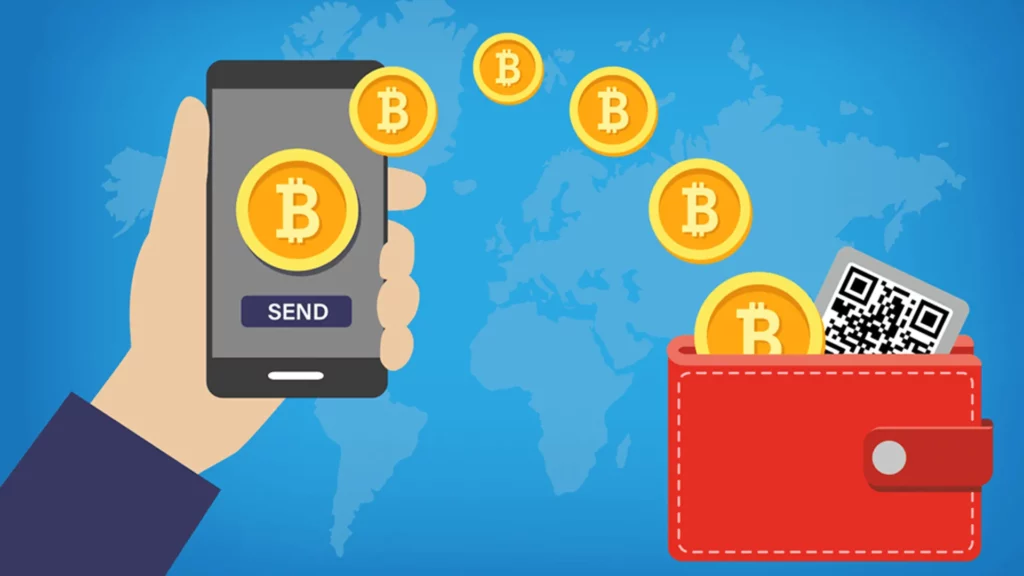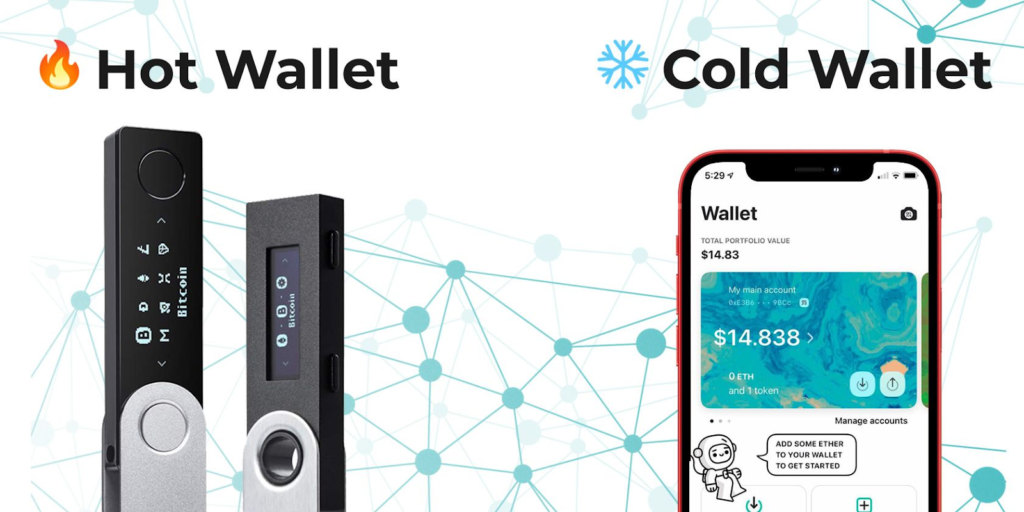Cryptocurrency has exploded in popularity over the last few years. As digital assets built on blockchain technology, cryptocurrencies like Bitcoin and Ethereum allow fast, secure, decentralized transactions and investments. However, properly and securely storing your cryptocurrency is critical. If you don’t take precautions, you risk losing your investment forever.

This comprehensive guide covers everything you need to know about securely storing cryptocurrency. We’ll compare the most popular storage options, like hardware wallets and software wallets, and provide tips to keep your coins safe. You’ll also find answers to common questions about crypto storage at the end. Securely Storing Your Cryptocurrency
Overview of Cryptocurrency Storage Options
When looking for secure cryptocurrency storage, you essentially have two options – hot wallets and cold wallets. Hot wallets are connected to the internet, while cold wallets are kept offline. Here’s an overview before we dive into the pros and cons of each in more detail:
Hot Wallets (Securely Storing Your Cryptocurrency)
Hot wallets include:
- Web/Exchange Wallets: Controlled by a third party like Coinbase or Binance. Convenient but higher risk.
- Online Wallets: Software that stores coins online. More control but still vulnerable.
- Mobile Wallets: Apps on smartphones connected to the internet. Handy but susceptible to hacking.
Cold Wallets
Cold wallets include:
- Paper Wallets: Your keys printed on a piece of paper. Very secure when generated properly.
- Hardware Wallets: Physical devices that store currency offline. Extremely secure but can be costly.
Below we’ll explore the unique benefits and drawbacks of each storage method.
Hot Wallet Options for Cryptocurrency
Hot wallets keep your currency connected to the internet. Let’s compare the main types available.

Web/Exchange Wallets
Cryptocurrency exchanges like Coinbase and Binance offer built-in web wallet storage. You don’t have to download anything – just create an account. Web wallets make buying, selling, and trading easy since your currency is ready on the exchange.
Pros:
- Beginner friendly and easy to use
- Funds ready to trade on crypto exchange
- Often insured (depends on exchange)
Cons:
- You don’t control the private keys
- More susceptible to hacking
- Could lose funds if exchange is hacked
Web wallets allow straightforward access to crypto trading. But store only small amounts here long term due to security risks.
Online Wallets
For more control than a web wallet, online wallets are downloadable software that stores your private keys online. Examples include Exodus and Electrum.
Pros:
- More security than exchange wallets
- Easier to use than offline options
- Feature-rich wallet software
Cons:
- Still susceptible to hacking via internet
- Company could go out of business
Software wallets put you more in charge of private keys while facilitating transactions. But network-connected vulnerabilities remain.
Mobile Wallets
Mobile apps like Trust Wallet provide crypto storage directly on your smartphone. This offers convenience for transactions on the go.
Pros:
- Make payments by scanning QR codes
- Secure private keys with PIN or biometric login
- Track portfolio balances easily
Cons:
- Small screens not ideal for managing lots of coins
- Risk losing if phone is lost, stolen or damaged
- Potential for hacks and mobile malware
Mobile wallets create quick access for small purchases and tracking. Limit storage amounts on them given hacking and physical phone risks.
Cold Wallet Options for Cryptocurrency
Now let’s examine popular cryptocurrency cold wallets for maximum security:

Paper Wallets
A paper wallet means printing out your private and public keys to store offline. Services like WalletGenerator.net create them.
Pros:
- Totally offline cold storage
- No specialized hardware needed
- Inexpensive to create
Cons:
- Can permanently lose if document destroyed
- Must create properly for full security
- Not as convenient to spend or trade
Paper wallets provide ultra-secure offline storage if generated properly. But you risk losing money if the printout becomes damaged or lost.
Hardware Wallets
Devices like Ledger and Trezor handle private key generation and digital signatures offline.
Pros:
- Extremely secure cold storage
- Easy to restore if hardware damaged
- Built-in screen for verifying transactions
Cons:
- Purchase hardware device for ~$50+
- Must properly safeguard recovery phrases
- Cryptocurrency only – not traditional assets
Hardware wallets enable offline transactions with peace of mind. Expect to pay for quality devices and maintain backup recovery phrases.
Storing Different Amounts of Cryptocurrency
Given the options above, here are some guidelines on storage solutions based on your holdings:
| Amount of Crypto | Recommended Storage |
|---|---|
| Up to $500 | Mobile or Web/Exchange Wallet |
| Up to $5,000 | Software Wallet |
| Over $5,000 | Cold Storage like Hardware or Paper Wallet |
Use a web or mobile wallet for convenience if you have nominal holdings. But take security up a notch and utilize cold storage for large investments.
Some additional tips:
- Diversify across more than one type of storage
- Use multi-signature functionality available in many wallets
- Store majority of holdings in cold storage
- Keep a small amount hot for convenient trading and transactions
Following this balanced approach allows you to maximize both security and functionality.
5 Must-Follow Tips to Keep Your Cryptocurrency Safe
In addition to smart storage methods above, implementing the following tips is critical:

1. Use Strong Unique Passwords
Create different complex passwords for exchange accounts, wallet software, email, and any crypto-related access. Using the same or simple password across services makes you vulnerable.
2. Enable Two-Factor Authentication (2FA)
Add an extra login step with access to your mobile phone when available. 2FA prevents criminals from accessing accounts even if they steal passwords.
3. Back Up Your Recovery Phrases
Carefully write down wallet and hardware wallet recovery phrases. Losing these could mean losing access to cryptocurrency forever. Store them offline in a secured location.
4. Update Software Frequently
Make sure to update wallet apps and devices constantly to receive security patch fixes for vulnerabilities. Sign up for update alerts when possible.
5. Watch Out for Scams
Avoid phishing emails, texts, downloads, fake exchange apps and questionable links that try to steal private keys or account information. Verify legitimacy directly before entering info or installing software.
Following basic security best practices enhances storage methods and helps protect holdings. Don’t let a hack or scam wipe out your investment!
Frequently Asked Questions on Cryptocurrency Storage
Still have some questions about securing your cryptocurrency? Below find answers to common queries:
What are private keys and why are they important?
A private key is essentially the password that grants access and control over cryptocurrency funds. Anyone who knows or obtains your private key can steal your coins. Private keys should be kept secure and never shared.
Can I just leave my cryptocurrency on an exchange?
Technically you can. But we don’t advise leaving significant investments on an exchange long term. Large exchanges like Mt Gox and BitGrail have been hacked. Store most crypto securely in an offline wallet.
How do transactions from a cold wallet work?
When making transfers from a cold storage wallet, the private key has to come online briefly to sign the transaction. With hardware wallets, the signing takes place securely on the device itself before relocking offline.
What happens if I lose a cold storage wallet?
With proper backups in place, you can restore cold storage devices or paper wallets using recovery phrases. Don’t lose these mnemonic phrases! If no backup, losing a cold wallet means losing the cryptocurrency.
Can I store other digital assets besides cryptocurrency?
Rules vary based on the wallet provider. Some support additional digital assets like NFTs. But cryptocurrency focused providers may not. Research compatibility before assuming storage options apply broadly across digital asset classes.
Is a safe deposit box appropriate for cryptocurrency?
On paper a safe deposit box provides very secure offline storage. However, we don’t recommend them for cryptocurrency. Reasons include no backups possible if keys lost, and questionable legal protections if funds are stolen.
Key Takeaways on Storing Cryptocurrency
- Hot wallets keep cryptocurrency connected online for convenient access. But use them only for smaller amounts due to hacking risks.
- For larger holdings, utilize cold storage like paper or hardware wallets kept completely offline and unreachable by internet attacks.
- Diversify across storage methods. Use hot wallets sparingly for needed transactions and trading, while keeping the majority of long term investments in cold storage security.
- Employ length and complex passwords unique to each service, 2FA, software updates, recovery phrase backups, and scam avoidance for optimal security on top of storage approaches.
Carefully implementing this guidance allows both usability with a portion of holdings, and stringent protections for the bulk of your valuable cryptocurrency investment. Don’t let security vulnerabilities, avoidable mistakes or hacks drain your hard-earned portfolio!

